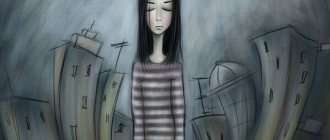Neurotic depression is one of the mental disorders. Often this disease has a protracted course and is accompanied by a number of syndromes:
- asthenic,
- phobic,
- hypochondriacal and other syndromes.
The disorder is a consequence of disturbances in the emotional sphere, the cause of which may be the loss of a loved one, uncertainty, problems in personal life and at work, and so on. If a person suffers from a disease such as neurotic depression, treatment should not be delayed. Ignoring the disease can lead to even greater health problems.
Identifying symptoms
The nature of neurotic depression is psychogenic. Features such as loss of strength and bad mood come to the fore.
Experts identify other symptoms of neurotic depression:
- increased irritability,
- feeling of anxiety,
- insomnia,
- headache.
The patient is haunted by phobias and obsessive, and sometimes suicidal, thoughts. There are also physical signs: joint pain, disturbances in the gastrointestinal tract, problems in the intimate area.
Stressful situations:
- dramatic experiences (loss of a lover, permanent activity, social position);
- conflict situation in the family sphere;
- problems related to the profession;
- economic problems;
- collapse of plans, expectations, aspirations and desires;
- intrapersonal conflict;
- complex, intractable situations (caring for a seriously ill relative);
- prolonged influence of low-intensity, but stable and “monotonous” conditions (disagreement, hostile environment in a team or family, lack of ability to completely relax).
Endogenous depression is an emotional disorder triggered by changes in the levels of hormones and neurotransmitters. It tends to be expressed in the form of a decrease in positive mood, inhibition of mental operations and a slowdown in motor activity.
Depression of an endogenous nature belongs to the internal biological origin of the disease. It is characterized by a constant course with periodic exacerbations. In these cases, hereditary location plays an important role. Consequently, cases of depression in the patient's family can be identified, but they usually occur on their own without any clear connection with external events. Sometimes such a connection is made with the psychological trauma of the patient or his family, but mostly this is the result of “psychologization,” that is, an attempt to find a more or less understandable explanation for the cause of depression. This disease does not depend on what events and actions occur in the individual’s life. Epidemiology is approximately similar by gender and does not depend on the degree of creation of social and financial wealth.
Thus, we can draw the following conclusion that neurotic depression is one of the variants of psychogenic disorders. The study of the dynamics of neurotic depression gives grounds to assert that it is a stage of neurotic development; it may be preceded by depressive neurosis, followed by a stage of characterological disorders. Endogenous depression, on the contrary, appears in the absence of external causes and is not dependent on incidents or current events in the daily life of the individual. This depression can occur against the background of other diseases, such as bipolar disorder or schizophrenia.
Neurotic depression and its types
Experts identify several forms of the disease: bipolar, unipolar, reactive, endogenous, situational.
The endogenous form is characterized by a long course; the monopolar form is characterized by a single emotional tone, without ups and downs of mood; the bipolar form is characterized by mood swings and a manic state.
Whatever diagnosis the doctor makes, the prognosis for complete healing is positive, and recovery can occur in a short time. Of course, provided that the patient adheres to all the doctor’s recommendations.
Prices
| Cost of treatment for mental illnesses and disorders | |
| Consultation with a psychotherapist - a doctor of the highest category, candidate of medical sciences. | 2500 rub. |
| Consultation with a psychiatrist - a doctor of the highest category, candidate of medical sciences. | 2500 rub. |
| Consultation with epileptologist K.M.N. | 3500 rub. |
| EEG with interpretation by epileptologist K.M.N. | 3500 rub. |
| Consultation with a somnologist | 5000 rub. |
| Repeated consultation with the doctor. | 1000 rub. |
| Psychological testing | 1000 rub. |
| Testing for latent depression (Nuller test). | 500 rub. |
| Screening assessment of anxiety and depression levels. | 200 rub. |
| Individual psychotherapy session, 1 hour. | 3000 rub. |
| Group psychotherapy session. | 1000 rub. |
| Hypnosis session. | 3000 rub. |
| Acupuncture session. | 1500 rub. |
| Transcranial electrical stimulation procedure using the Transair device | 2000 rub. |
| Relaxation session using the Minds Eye device (USA) | 2000 rub. |
| Audiovisual stimulation session using virtual reality glasses. | 2000 rub. |
Make an appointment
How to treat neurotic depression
The diagnosis of “neurotic depression” is made by a psychiatrist based on tests and the presence of symptoms corresponding to the disease. The modern approach involves the use of several techniques - pharmacological, psycho- and social therapy. With the help of antidepressants and tranquilizers, acute manifestations of the disease are relieved, after which the stage of communication between the patient and the doctor follows. Psychotherapy sessions end only after the patient has fully recovered. Along with this, family and friends should take care of creating the most comfortable living conditions for the person suffering from this form of depression.
Other effective techniques include:
- hypnosis treatment,
- homeopathy,
- dolphin therapy,
- physical exercise.
Treatment for neurotic depression should be comprehensive.
Anxiety-depressive disorder - symptoms and treatment
In the early stages, anxiety-depressive disorder can be easily corrected. With properly selected therapy, the result is noticeable within 1-2 weeks.
The effectiveness of treatment largely depends on the patient’s desire and desire to understand the cause of his illness and correct the situation. A significant criterion for successful therapy is the patient’s trusting relationship with the doctor (compliance), and the willingness to follow all the specialist’s recommendations.
Treatment must be comprehensive. It includes psychotherapy, medications and physical therapy.
Psychotherapy
Psychotherapy is an effective method of treating anxiety-depressive disorder, especially in the early stages. The doctor selects the method of working with the patient individually. There are quite a lot of options. These include:
- Cognitive behavioral psychotherapy - work aimed at managing thoughts and behavior;
- Gestalt therapy - increasing awareness, i.e., one’s own responsibility for one’s life;
- hypnosis - working with personality problems through immersion in a state of increased concentration and suggestibility;
- family psychotherapy - work with the patient and his family members;
- auto-training - control of mental state through self-hypnosis.
The doctor, together with the patient, draws up a plan for correcting life, daily routine, sleep, work and rest, and teaches relaxation techniques [10].
Drug therapy
This method of treatment consists of taking tranquilizers, antidepressants, and beta-blockers.
Tranquilizers are prescribed according to strict indications to reduce anxiety, fear, and normalize sleep. They successfully cope with panic attacks and somatic disorders, stabilize the functioning of the autonomic nervous system, have an anticonvulsant effect, and relax muscles.
Since anxiety-depressive disorder causes an imbalance of neurotransmitters (serotonin, norepinephrine and GABA), benzodiazepine tranquilizers - phenazepam, elzepam, seduxen, elenium - are most often used in treatment. They are prescribed for a short course - up to 2-4 weeks, as they can lead to drug dependence and withdrawal syndrome (worsen the condition after stopping use).
Currently, a new generation of tranquilizers (non-benzodiazepine) are widely introduced into therapeutic practice - these are histamine H1 receptor blockers (for example, hydroxyzine). Such drugs do not impair cognitive functions, act quickly and do not lead to the development of dependence and withdrawal syndrome.
antidepressants are prescribed in a long course together with tranquilizers, since the effect of antidepressants is cumulative (you have to wait up to two weeks for the start), and tranquilizers begin to act after 15 minutes. Antidepressants help relieve anxiety, autonomic disorders, increase the pain threshold (used for pain symptoms), relieve symptoms of depression: mood, sleep, appetite improve, apathy and melancholy disappear. They are not addictive. They are selected strictly individually.
Antidepressants include:
- SSRIs - fluoxetine, paroxetine, escitalopram, citalopram, sertraline, fluvoxamine;
- tricyclic antidepressants - amitriptyline;
- dual-action antidepressants - venlafaxine, duloxetine [8][9].
The first-line drugs of choice for the treatment of anxiety-depressive disorder are SSRIs together with benzodiazepine tranquilizers. Second-line drugs are tricyclic antidepressants and non-benzodiazepine tranquilizers [4].
Beta blockers suppress autonomic symptoms: tachycardia, blood pressure surges, arrhythmia, sweating, weakness, tremor.
Commonly used are propranolol, atenolol, and metoprolol [2]. It is important to evaluate the interactions of these drugs with antidepressants, as many combinations are undesirable.
Sometimes low-potency neuroleptics (antipsychotics) may be prescribed in small doses, for example, thioridazine or sulpiride. However, after taking them, the patient may experience weakness, a drop in blood pressure, decreased libido (sexual desire), weight gain, galactorrhea (excretion of breast milk), and menstrual irregularities [8]. Therefore you need to be careful.
Physiotherapy
Commonly used physical therapy techniques include therapeutic massage, self-massage, electromassage and electrosleep. These procedures relax, calm, reduce tension, and normalize sleep.
Where to treat neurotic depression
Rehab Family, a family addiction treatment clinic, specializes in the treatment of mental disorders, including neurotic depression. Experienced specialists working in the clinic understand: in order to defeat the disease, one should fight not the symptoms, but the causes that led to their appearance. Only psychotherapy can cope with this task. This could be cognitive or gestalt therapy, psychoanalysis and art therapy, breathing exercises and neurolinguistic programming.
Patients of the clinic, with the help of psychologists, psychotherapists, and psychiatrists, will be able to find the often hidden causes of suffering and learn to cope with them. Unlike other institutions, Rehab Family treats each person not as an individual, but as part of a family and community.
An important nuance in the treatment of depressive disorders in our clinic is treatment without the use of harmful drugs. This approach allows achieving high results in treatment.
Main factors of occurrence
The etiology of depressive neurosis is always psychogenic (stress due to external or internal factors), and contains the causes of neurosis and depression, as well as part of their symptoms, which often complicates diagnosis in the early stages of development. In addition, the clinical picture of the disorder is complemented by somato-vegetative symptoms, which further complicates diagnosis and differentiation with other pathologies.
Neurotic depression can occur in groups of people with directly opposite psychotypes. The first of them is people who are confident in their beliefs, distinguished by categorical statements, setting new goals and achieving them. At the same time, they hide their inner world from others. A large place in it is given to concerns and worries about personal leadership and the assessment of their actions by those around them.
The second group of people susceptible to neurotic depression includes individuals who poorly adapt to various life complications and even natural changes. They are characterized by low self-esteem, inability to make decisions, daydreaming in the absence of action.
Factors that can cause neurotic disorders such as depression in both groups can be long-term psychotraumatic circumstances: personal failures in professional activities, failures in personal life, social relationships. Among these factors, the most influential are:
- constant suppression of real feelings and emotions, hiding true feelings from others;
- inability to distance yourself from a situation, not to get involved, not to take it to heart;
- an overly heightened sense of responsibility and desire to be the best;
- conflict between the goal and the means to achieve it;
- emotional hunger - the absence of like-minded people, loved ones, friends, relatives, the inability to do what you love, to communicate with the people you want.
The accumulation of these unfavorable factors gives a person the impression that it is impossible to correct the situation; he does not even try to look for ways to solve problems, directing all efforts to hiding the internal conflict. As a result, the nervous system cannot withstand such stress, and the first visible sign of depressive neurosis appears - autonomic-somatic disorders.
Prevention of depression
To avoid the development of depression, you must follow the following recommendations:
- Properly distribute workload and rest. Sleep should be full for at least eight hours.
- Maintain a daily routine. The day is for being awake and the night is for resting.
- Proper nutritious nutrition will strengthen the body.
- Lead a healthy lifestyle. To feel good, you need to play sports, you can just go jogging every morning.
- Avoid stressful situations.
You should try to find interesting hobbies that bring joy and satisfaction. Positive emotions are the main prevention against depression.
When to start treating neuroses
As early as possible, the effectiveness of therapy depends on this. First of all, it is necessary to accurately establish the nature of the symptoms that are tormenting you. Only an experienced psychiatrist can give the most accurate assessment of a person’s condition and establish an accurate diagnosis.
As part of our research, in collaboration with the National Institute of Mental Health, we introduced a treatment program that demonstrated a significant increase in effectiveness compared to conventional approaches. Despite the fact that most patients prefer psychotherapeutic methods rather than medications. This study has proven the benefits of our combination plans, where pharmacotherapy is judiciously combined with psychotherapy. Since the recovery of each person depends on many factors, it is necessary to ensure a complete, high-quality diagnosis in each specific case. Life, situations and the formation of the body are unique and not duplicated, so naturally a special treatment for neurosis in the clinic is required in each specific case. A method that helped one will never work for another, despite the similarity of the situation and symptoms. That is why the Transfiguration clinic develops its own individual program for each client. Development takes some time, so patience and perseverance are required from the patient for a complete cure.
Kinds
Clinical practice distinguishes several forms of development of this disease. Each of the neuroses can differ in a number of features of the course and requires an individual approach:
- Neurasthenia is characterized by increased fatigue, decreased performance and concentration, increased vulnerability, all of which is accompanied by frequent headaches.
- Hysterical - nervousness and irritability are noted, there is a tendency to convulsions or paresis. The reaction to the most ordinary phenomena may be inadequate.
- A sad mood is depression, accompanied by apathy, increased fatigue, decreased performance, and a negative emotional background. There may be suicidal thoughts or tendencies.
- Obsessiveness – a person develops uncharacteristic thoughts or actions, self-control decreases, impulses are not restrained.
- Hypochondriacal – characterized by a fear of being subjected to a serious illness or getting into an insoluble situation.
Specialists also study and note such forms of manifestation of cerebral psychoneurosis at an early stage, such as:
- Tics - even imperceptible, but constant muscle contractions are often caused by developing neurosis.
- Insomnia - sleep disturbances are one of the most obvious signs of blues.
- Fears and anxieties - unreasonable and obsessive fears indicate the development of a neurotic coma.
- Apathy is indifference to favorite activities, decreased activity most often accompanies neurotic well-being and a sad mood.
Events
08.11.21
Residents' trip to the Zvenigorod club "Goliath"
Leisure activities are an integral part of the rehabilitation program for residents. Team games, visiting museums, theaters, exhibitions, picnics...Read more (~2 min.)
«
13.10.21
Travel of rehabilitators of the “Zdravnitsa” Center to “Ruzskaya Alaska”
One of the important tasks of a rehabilitation center for addicted people is to teach them to enjoy life in sobriety, to find...Read more (~2 min.)
«
21.09.21
Guests from the Moscow Regional Duma in
In September, a delegation of candidates for deputies of the Moscow Regional Duma, the head of the election headquarters of the Rodina party, visited. [zdravnews] Employees...Read more (~1 min.)
«
31.08.21
How does the socialization of addicts proceed?
Social adaptation (Resocialization and Outpatient Clinic) is one of the stages of rehabilitation. Characterized by the return or strengthening of social ties, the elimination of manifestations of social...Read more (~2 min.)
«
All events
Features of male and female symptoms
The difficulty of making a diagnosis for neurotic and depressive disorders lies in the fact that other neurotic and mental disorders have many symptoms. In total, there are two groups of symptoms: mental and somatic. Psychiatric include:
- Increased fatigue, causing decreased performance.
- Sleep disorders – insomnia or constant drowsiness.
- Chronic or regular feeling of anxiety.
- Lack of confidence in yourself, your actions and decisions.
- Decreased self-esteem, inferiority complex, social contacts and their decline, dissatisfaction with oneself and one’s external appearance.
- Inadequate self-perception, dysmorphophobia.
- Somatic signs are usually more obvious and unambiguous.
Among them are:
- Lungs or more pronounced tremor of the limbs, especially the hands.
- Increased sweat production.
- Reduced blood pressure.
- Fainting, loss of consciousness.
- Heartache.
- Phantom pain of various types.
As for the specific signs characteristic of neurotic well-being, depressive neurosis in men and women, there are not as many of them as it seems. Most of these symptoms are dictated by differences in the gender socialization of men and women, and only a few by differences in physiology.
In men with depression, there is a marked decrease in potency and libido. Psychologically, men most often withdraw into themselves. If the cause of development is not alcohol or other addiction, the risk of turning to alcohol or drugs when depressed will be higher than in women.
Women are more susceptible to neurotic disorders, since unstable hormonal levels cause increased emotionality and vulnerability. This makes women more susceptible to stress. As in both men and women, libido decreases when despondent. In addition, in response, they note increased emotionality and susceptibility to the influence of the menstrual cycle. A pronounced change in behavior with the so-called premenstrual syndrome is considered one of the main symptoms of nervousness or blues.
Signs of clinical depression
A key sign of clinical depression is low mood. A person loses the ability to receive joy from anything. There is a negative assessment of others and oneself. The person experiences psychological inhibition and decreased physical tone.
Physiological
Physical activity decreases due to a lack of desire to do work or household chores. A person becomes lazy and gloomy, unable to start and finish any activity. Sleep is disturbed, appetite is lost or increased, libido decreases.
Psychological
In a state of depression, the functioning of the brain and central nervous system is disrupted. A person becomes indifferent to everything, his memory deteriorates, and his self-esteem decreases. In a severe stage, it is impossible to cope with this condition on your own.
Behavioral
A person has passivity, it is difficult to involve him in active activity. He begins to avoid contact with other people and refuses entertainment. Often, when people are depressed, they begin to abuse alcohol and drugs.








